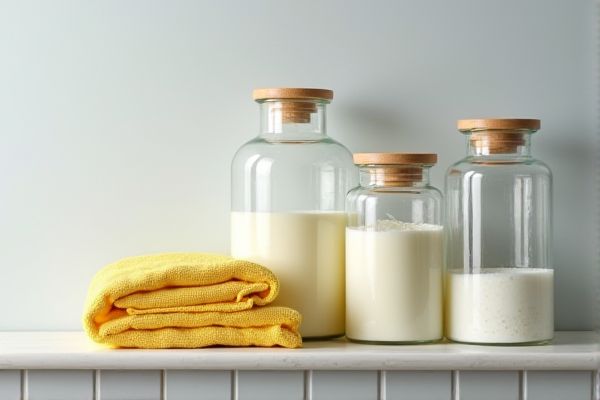
Glass jars detergent containers offer superior chemical resistance and environmental sustainability compared to plastic canisters, which may leach harmful substances and contribute to plastic waste. Discover which option best suits Your needs for safe and eco-friendly detergent storage by reading the full article.
Table of Comparison
| Feature | Glass Jars Detergent | Plastic Canisters |
|---|---|---|
| Material | Tempered or borosilicate glass | High-density polyethylene (HDPE) or polypropylene (PP) |
| Durability | Fragile, prone to breakage | Impact-resistant, flexible |
| Environmental Impact | Reusable, recyclable, eco-friendly | Mostly recyclable, but contributes to plastic waste |
| Weight | Heavier, less portable | Lightweight, easier to carry |
| Seal/Closure | Metal or plastic lids with airtight seals | Snap-on or screw caps, often airtight |
| Cost | Higher initial cost | Lower cost, mass-produced |
| Transparency | Clear, visible contents | Opaque or semi-transparent |
| Safety | Risk of shards if broken | Safe, shatterproof |
| Refillability | Easy to clean and refill | Less suitable for multiple refills |
Introduction to Glass Jars and Plastic Canisters
Glass jars offer a sustainable and non-toxic alternative for detergent storage, preserving product freshness without chemical leaching. Plastic canisters provide lightweight, shatter-resistant containers with versatile shapes but may pose environmental concerns due to non-biodegradability. Choosing between glass and plastic impacts your detergent's shelf life, safety, and ecological footprint.
Environmental Impact: Glass vs. Plastic
Glass jars for detergent offer a significantly lower environmental impact due to their recyclability and ability to be reused multiple times without degradation in quality. Plastic canisters, while lightweight and durable, contribute to pollution and landfill waste as many are not effectively recycled and often break down into harmful microplastics. Choosing glass over plastic reduces carbon emissions and supports a circular economy by minimizing single-use packaging waste.
Durability and Longevity Comparison
Glass jars detergent containers offer superior durability, resisting scratches, stains, and odors over time, which ensures product purity and long-term use without degradation. Plastic canisters, while lightweight and impact-resistant, tend to degrade, warp, or absorb scents and chemicals after prolonged exposure, reducing their longevity. Choosing glass jars enhances sustainability by providing reusable, eco-friendly storage that maintains detergent quality better than plastic alternatives.
Aesthetic and Design Considerations
Glass jars offer a sleek, timeless aesthetic with their clear, reflective surfaces that enhance the visibility of detergent contents while complementing modern and rustic kitchen designs. Plastic canisters provide versatility in shapes and colors, allowing for customizable design options, but often lack the premium look and eco-friendly appeal of glass. You can elevate your laundry space by choosing glass jars for a sophisticated, durable storage solution that doubles as decorative accents.
Product Preservation and Quality
Glass jars detergent containers provide superior product preservation by being impermeable to air and moisture, thereby maintaining detergent freshness and efficacy longer than plastic canisters. Unlike plastic, glass does not leach chemicals or absorb odors, ensuring consistent detergent quality over time. The non-porous nature of glass also protects against contamination, contributing to the overall longevity and performance of the stored detergent.
Safety and Health Implications
Glass jars for detergent are non-toxic, non-reactive, and free from harmful chemicals like BPA, making them safer for long-term storage and reducing health risks associated with chemical leaching. Plastic canisters, especially those made from lower-quality plastics, may release toxins and endocrine-disrupting chemicals over time, posing potential health hazards upon prolonged exposure. The inert nature of glass also prevents contamination, ensuring detergent remains pure and safe for household use.
Cost Analysis: Glass Jars vs. Plastic Canisters
Glass jars typically incur higher upfront costs due to material and manufacturing expenses, but they offer better long-term value through durability and reusability. Plastic canisters are generally cheaper initially but may require more frequent replacement, leading to increased costs over time. Environmental factors and recycling potential also influence the overall cost-effectiveness of each option in detergent storage.
Ease of Use and Convenience
Glass jars for detergent offer clear visibility of contents and are easy to clean, enhancing convenience during use. Plastic canisters are lightweight and often feature ergonomic designs with secure lids, ensuring quick access and portability. Both options provide user-friendly storage, but plastic canisters tend to be more practical for on-the-go usage.
Recycling and Disposal Options
Glass jars for detergent offer superior recycling options due to their high recyclability and ability to be processed repeatedly without quality loss, making them environmentally sustainable. Plastic canisters, while often recyclable, face challenges such as lower recycling rates and contamination risks, which can limit their reusability and lead to increased landfill waste. Choosing glass jars reduces environmental impact by promoting circular economy principles and minimizing plastic pollution in waste management systems.
Choosing the Best Option for Your Detergent Storage
Glass jars offer superior chemical resistance and prevent detergent contamination, making them ideal for long-term storage and eco-friendly households. Plastic canisters provide lightweight durability and often feature airtight seals that protect detergent from moisture and clumping, suitable for frequent use and portability. Considering factors like environmental impact, storage duration, and ease of use helps determine the best container for your detergent needs.
 homyna.com
homyna.com